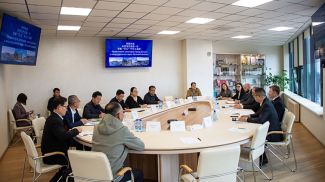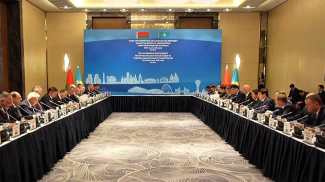MINSK, 25 May (BelTA) – The trade between Belarus and China amounted to $1.2 billion in the first quarter of 2022, Deputy Economy Minister Alesya Abramenko said at the sixth session of the commission on trade and economic cooperation of the Belarus-China intergovernmental cooperation committee. The meeting was held in a mixed format, BelTA learned from press service of the Economy Ministry.
According to Alesya Abramenko, the trade between Belarus and China in the first quarter of 2022 was estimated at $1.2 billion. Belarus is China's top 10 suppliers of potash fertilizers, whey, meat products, and rapeseed oil.
“This was achieved thanks to consistent and comprehensive work of the joint commission. More and more producers of meat and dairy products are accredited in China. Two Belarusian manufacturers received permission to sell their products on the Chinese market following the results of a video inspection. A bilateral working group is working to ease trade procedures. Export applications worth almost $2 billion have been compiled and submitted to the Chinese side. More than 70 joint forums and seminars have been held to promote export since the last meeting of our commission. Four rounds of talks of bilateral working groups to discuss the draft agreement on trade in services and investment were held. The work on a number of the most important chapters of the document has already been completed. The goal is to sign the agreement in 2023,” the deputy economy minister said.
In her report, Alesya Abramenko put forward a number of proposals to increase trade. “Firstly, it is necessary to expand direct contacts between the business communities of the two countries. Secondly, we need to enlarge the assortment of products supplied to China. This is one of the priorities for our government and we really hope that more Belarusian enterprises will get access to the Chines market. Thirdly, we need to promote new mechanisms for increasing bilateral trade, with a focus on the establishment of export-import joint ventures, placing Belarusian goods on Chinese electronic trading platforms. Fourthly, we should improve logistics and this can be achieved by making more use of the fast rail service. New green corridors will allow faster cargo transportation. Fifthly, it is necessary to intensify investment within the framework of existing bilateral projects, to launch new import-substituting enterprises. This can be done through the development of the China-Belarus Industrial Park Great Stone and closer interregional cooperation. The implementation of these proposals will help boost our partnerships,” she concluded.













